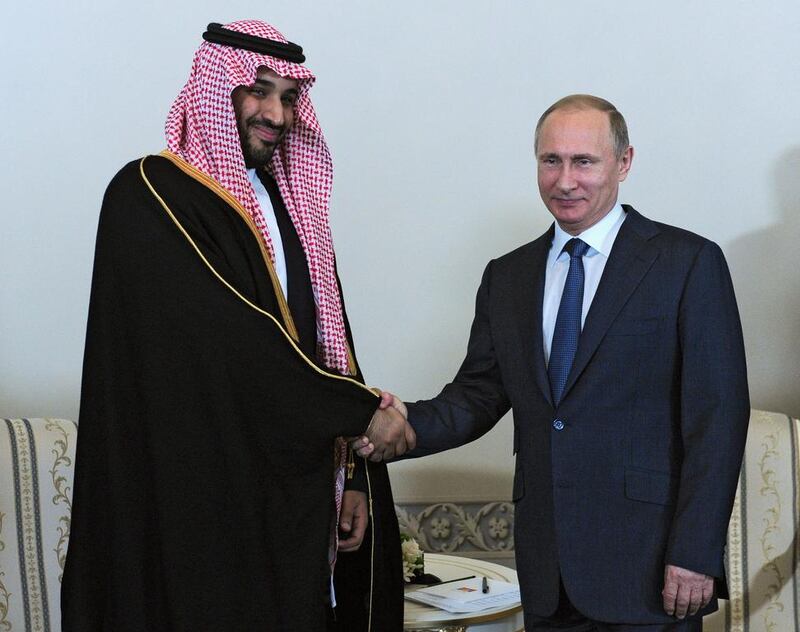Saudi Arabia and Russia are rarely on the same side in the Middle East’s various conflicts.
It was surprising therefore to see the kingdom’s deputy crown prince and defence minister Mohammed bin Salman meet Russia’s president Vladimir Putin last week, in an effort to improve ties between the two countries.
Prince Mohammed even said his father, King Salman, had accepted an invitation to visit Russia, possibly as soon as autumn, Russian media reported.
The Saudi ruler pulled out of a summit of Arabian Gulf leaders with president Barack Obama in the United States in May saying he had to focus on the Yemen conflict.
Prince Mohammed, 29, appeared relaxed sitting opposite Mr Putin last Thursday and meeting Saudi Arabian students studying in Russia.
Given the prince’s “growing prominence at home and his obvious closeness to his father – who seems to use him as a special envoy in addition to his other responsibilities – the possibility of significant upgrades to the Saudi-Russian relationship seems likely”, said Simon Henderson, a Gulf expert at The Washington Institute.
Six deals were signed during his visit, on everything from military ties to energy development with Russia possibly helping Saudi Arabia construct and operate the 16 nuclear reactors it plans to build.
“Saudi Arabia is keen to strengthen better relations with the countries of the world,” said a Saudi Arabian official. “As Russia is an important country, there are many areas of cooperation between the two countries that serve mutual interests.”
But such cooperation might seem to contradict the region’s current conflicts and the resulting network of alliances.
Russia has provided steadfast support to Syrian president Bashar Al Assad, who Saudi Arabia has sought to weaken if not outright remove from power by backing a variety of rebel groups opposed to him.
Russia is also likely to begin shipping S-300 anti-aircraft defence systems to Iran, Saudi Arabia’s main regional rival, after deliveries were delayed for years following international pressure. There are also plans to move forward with an oil-for-goods swap programme between Moscow and Tehran.
But Prince Mohammed’s visit, during an economic forum in Saint Petersburg, appeared to be about starting to find a new way forward.
“While everyone acknowledged that the divergence over Syria has led to frosty relations between the two countries over the past few years, the Saudis still see Russia as an important global power with which it needs to have solid relations to keep oil prices stable and because it could be a reliable weapons supplier,” said Fahad Nazer, an analyst at Virginia-based consultancy JTG Inc who used to work at the Saudi embassy in Washington.
“In addition, Russia has shown willingness to assist Saudi Arabia with its civilian nuclear energy programme, for which it has committed close to US$80 billion [Dh294bn].”
Since becoming ruler in January, King Salman has moved quickly to implement new policies, promoting a younger generation of officials, launching a military intervention in Yemen, and moving to repair ties with Turkey and Qatar.
The fresh attempt to change its relationship with Russia falls into the same policy of rapprochement. Adding weight to Prince Mohammed’s visit was the presence of Saudi Arabia’s foreign minister Adel Al Jubeir and oil minister Ali Al Naimi.
Improved ties between Saudi Arabia and Russia could help to end the war between the Assad regime and rebels in Syria.
“Saudi Arabia has gone from openly criticising Russia to trying to bridge the differences,” said Yury Barmin, a Russian analyst based in Moscow focused on the Middle East.
For its part, Russia has maintained a highly pragmatic strategy of compartmentalising the different aspects of its Middle East policy. Even if Moscow supports Mr Al Assad, it has no problem doing business with Arab Gulf countries.
Russia already has a significant business relationship with the UAE and discussions are taking place about building an airport together in Cuba.
“Moscow wants to be seen as an influential power in the Middle East, just like its predecessor, the Soviet Union, was. It does so primarily through arms trade and oil and gas deals, just like the USSR did and has no ambition, at least for now, to expand its influence,” said Mr Barmin.
Russia has also backed a United Nations security council resolution calling for Iranian-backed rebels that Saudi Arabia and its allies are fighting in Yemen to withdraw from areas they have seized.
While there might be concerns that a closer relationship with Russia might drive a wedge between Saudi Arabia and the United States, this is unlikely.
The US has encouraged Arab Gulf states to formulate more independent policies, especially those that contribute to dialogue that could resolve conflict. The security cooperation between the countries and the US is also much broader than Russia can match, even if the GCC currently aims to strengthen ties with a variety of countries to become less dependent on one main ally.
“While some Saudis have advocated strengthening relations with Russia because they do not come with “preconditions” – a clear reference to the US – I think the Saudis realise that no single power can replace the US in the region,” said Mr Nazer.
jvela@thenational.ae
Follow The National’s foreign news coverage on Twitter: @thenationalROAM





